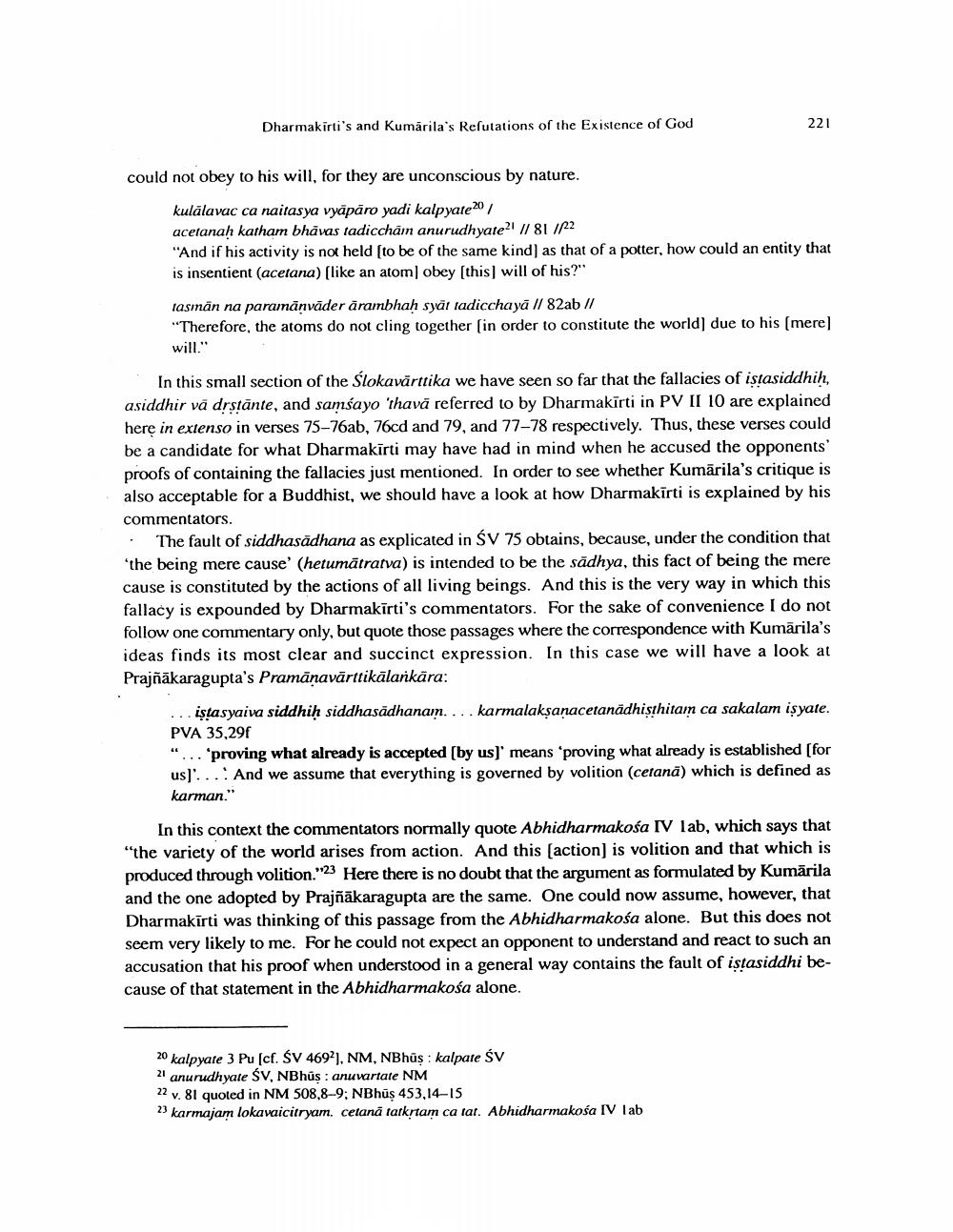Book Title: Dharmakirtis And Kumarilas Refutations Of Existence Of God Author(s): Helmut Krasser Publisher: Helmut Krasser View full book textPage 7
________________ Dharmakirti's and Kumarila's Refutations of the Existence of God could not obey to his will, for they are unconscious by nature. kulálavac ca naitasya vyāpāro yadi kalpyate20 / acetanah katham bhāvas tadiccham anurudhyate? // 81 82 "And if his activity is not held to be of the same kind) as that of a potter, how could an entity that is insentient (acetana) (like an atom obey (this will of his?" tasman na paramānvāder ārambhah syat tadicchayā // 82ab // "Therefore, the atoms do not cling together (in order to constitute the world) due to his (merel will. will." In this small section of the Slokavārttika we have seen so far that the fallacies of istasiddhih, asiddhir va drstānte, and samśayo 'thavā referred to by Dharmakīrti in PV II 10 are explained here in extenso in verses 75-76ab, 76cd and 79, and 77-78 respectively. Thus, these verses could be a candidate for what Dharmakīrti may have had in mind when he accused the opponents proofs of containing the fallacies just mentioned. In order to see whether Kumārila's critique is also acceptable for a Buddhist, we should have a look at how Dharmakirti is explained by his commentators. • The fault of siddhasādhana as explicated in SV 75 obtains, because, under the condition that 'the being mere cause' (hetumātratva) is intended to be the sādhya, this fact of being the mere cause is constituted by the actions of all living beings. And this is the very way in which this fallacy is expounded by Dharmakirti's commentators. For the sake of convenience I do not follow one commentary only, but quote those passages where the correspondence with Kumārila's ideas finds its most clear and succinct expression. In this case we will have a look at Prajñākaragupta's Pramanavārttikalarkara: ... istasyaiva siddhiḥ siddhasādhanam....karmalaksanacetanädhisthitam ca sakalam isyate. PVA 35,298 "... 'proving what already is accepted [by us)' means 'proving what already is established (for us)... And we assume that everything is governed by volition (cetana) which is defined as karman." In this context the commentators normally quote Abhidharmakośa IV lab, which says that "the variety of the world arises from action. And this (action) is volition and that which is produced through volition."23 Here there is no doubt that the argument as formulated by Kumarila and the one adopted by Prajñākaragupta are the same. One could now assume, however, that Dharmakīrti was thinking of this passage from the Abhidharmakośa alone. But this does not seem very likely to me. For he could not expect an opponent to understand and react to such an accusation that his proof when understood in a general way contains the fault of istasiddhi because of that statement in the Abhidharmakośa alone. 20 kalpyate 3 Pu (cf. ŚV 469%), NM, NBhus : kalpate ŚV 21 anurudhyate ŚV, NBhús : anuvartate NM 22 v. 81 quoted in NM 508,8-9; NBhus 453,14-15 23 karmajam lokavaicitryam. celana tarkrtam ca tat. Abhidharmakośa IV labPage Navigation
1 ... 5 6 7 8 9
